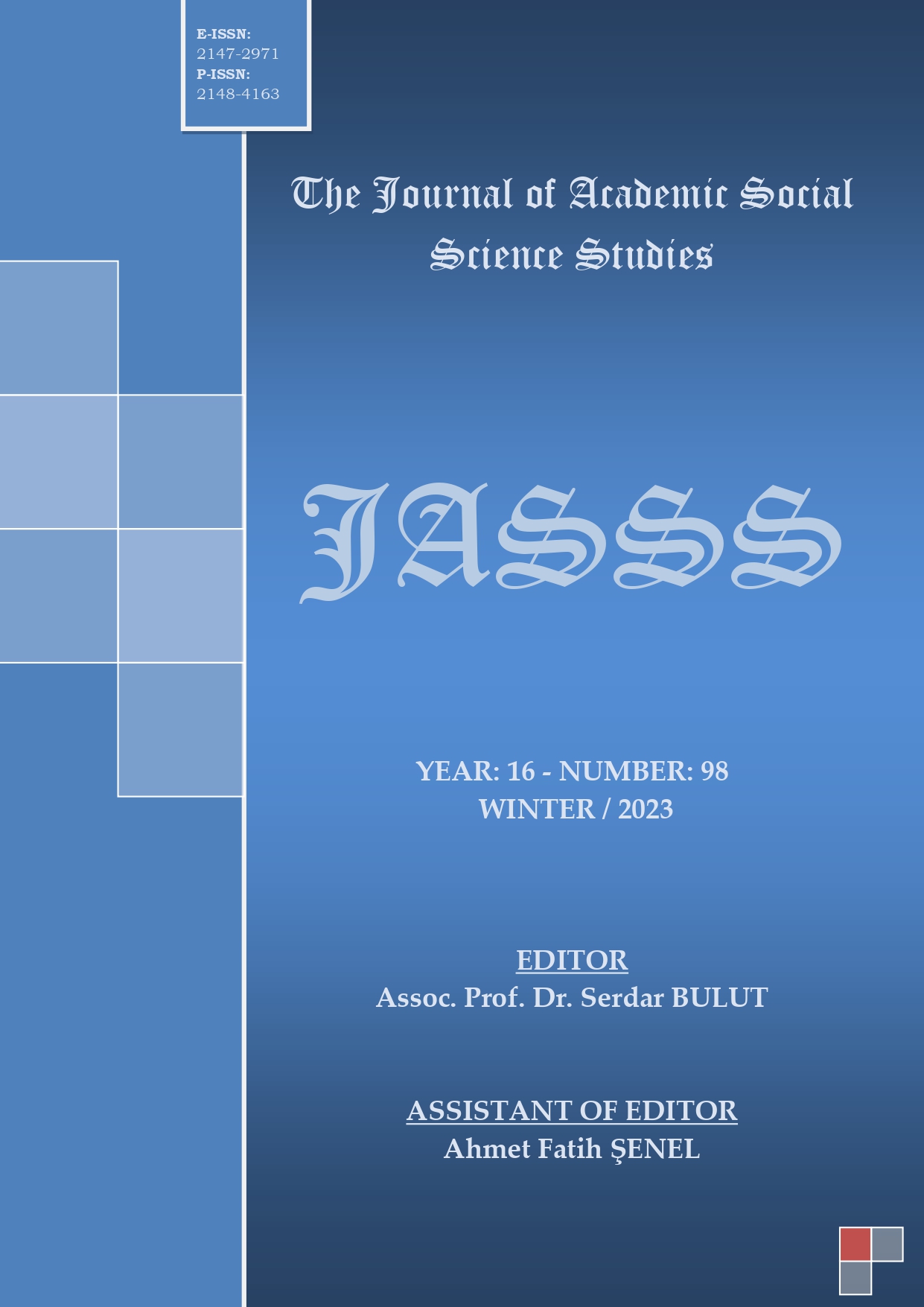LİSE ÖĞRENCİLERİNİN SOSYAL KAYGI DURUMLARI İLE SOSYAL MEDYADA BEĞENİLMEME KORKULARI ARASINDAKI İLIŞKİNİN İNCELENMESİ
Author :
Abstract
Bu çalışmanın amacı lise öğrencilerinin sosyal kaygı durumları ile sosyal medyada beğenilmeme korkuları arasındaki ilişkinin incelenmesi ve sosyal kaygı düzeyleri ile sosyal medyada beğenilmeme korkularını etkileyen değişkenlerin belirlenmesidir. Araştırmanın çalışma grubunu Ankara ili Keçiören ilçesinde lise öğrenimine devam eden 511 öğrenci oluşturmuştur. Veri toplama araçları olarak araştırmacılar tarafından oluşturulan “Genel Bilgi Formu”, Aydın ve Tekinsav-Sütçü (2007) tarafından Türkçe’ye uyarlanan ‘Ergenler İçin Sosyal Kaygı Ölçeği’ (ESKÖ), Söner ve Yılmaz (2021) tarafından geliştirilen ‘Sosyal Medya Beğenilmeme Korkusu Ölçeği’ kullanılmıştır. Araştırmada ‘Ergenler İçin Sosyal Kaygı Ölçeği’ ve ‘Sosyal Medya Beğenilmeme Korkusu Ölçeği’ arasındaki ilişkiyi ortaya koymak için Spearman Korelasyon Katsayısı hesaplanmıştır. Değişkenlerle ilgili analizlerde ise; T Testi, Tek Yönlü Varyans Analizi, Mann Whitney U Testi ve Kruskal Wallis Testi kullanılmıştır. Araştırmadan elde edilen sonuçlarda; Ergenler İçin Sosyal Kaygı Ölçeği toplam puanlarında, cinsiyet değişkenine göre kızlar lehine anlamlı farklılık saptanmış; sosyal medyada geçirilen süre değişkenine göre toplam puanda anlamlı bir farklılık bulunmamıştır. Sosyal Medyada Beğenilmeme Korkusu Ölçeğinin toplamından elde edilen puanlarda kızların sıra ortalamasının erkeklere oranla anlamlı düzeyde yüksek olduğu, sosyal medyada geçirilen sürenin de anlamlı farklılık oluşturduğu saptanmıştır. İki ölçek toplam puanları arasındaki ilişki incelendiğinde ise, her iki ölçek arasında orta düzeyde pozitif yönlü anlamlı bir ilişki olduğu saptanmıştır. Buradan hareketle; ergenlik döneminde yer alan gençlere yönelik medya okuryazarlığı ve ebeveynlerine yönelik dijital ebeveynlik içerikleri kapsamında eğitimlerin düzenlenmesi yoluyla gençlerin sosyal kaygı yaşamalarının önüne geçilebilmesi önerilmektedir.
Keywords
Abstract
The aim of this study is to examine the relationship between high school students' social anxiety and their fear of not being liked on social media and to determine the variables which affect their social anxiety levels and their fear of not being liked on social media. The sample size consisted of 511 students currently attending high school in Keçiören district of Ankara. Data collection tools include the "General Information Form" created by the researchers, the "Ergenler İçin Sosyal Kaygı Ölçeği" (ESKÖ; Social Anxiety Scale for Adolescents) adapted to Turkish by Aydın and Tekinsav-Sütçü (2007), and the "Sosyal Medya Beğenilmeme Korkusu Ölçeği" (Fear of Not Being Liked on Social Media) scale developed by Söner and Yılmaz (2021). In the study, Spearman Correlation Coefficient was utilized to reveal the relationship between the 'Social Anxiety Scale for Adolescents' and the 'Fear of Not Being Liked on Social Media'. In analyzes related to variables; T Test, One-Way Analysis of Variance, Mann Whitney U Test and Kruskal Wallis Test were used. In the results obtained from the research; a significant difference was found in terms of gender for the total scores of the 'Social Anxiety Scale for Adolescents' in favor of girls; however, there was no significant difference in the total score regarding the time spent on social media. It was determined that, on average, scores obtained by girls from the complete 'Fear of Not Being Liked on Social Media' scale were significantly higher than that of boys, and the time spent on social media also made a significant difference. When the relationship between the total scores of the two scales was examined, it was determined that there was a moderate positive relationship between the two scales. Based on this; it can be recommended to organize lessons within the scope of media literacy and provide digital parenting content for parents of adolescents to help prevented them from experiencing social anxiety.
